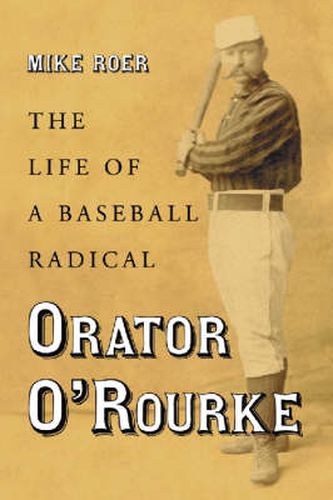Readings Newsletter
Become a Readings Member to make your shopping experience even easier.
Sign in or sign up for free!
You’re not far away from qualifying for FREE standard shipping within Australia
You’ve qualified for FREE standard shipping within Australia
The cart is loading…






This title is printed to order. This book may have been self-published. If so, we cannot guarantee the quality of the content. In the main most books will have gone through the editing process however some may not. We therefore suggest that you be aware of this before ordering this book. If in doubt check either the author or publisher’s details as we are unable to accept any returns unless they are faulty. Please contact us if you have any questions.
As a player, manager, team captain, umpire, owner and league president, Jim O'Rourke (1851-1918) spoke for the players in the emerging game of baseball. O'Rourke’s career paralleled the rise of the game from a regional sport with few strategies to the national pastime. Nicknamed
Orator
for his booming voice and his championing of the rights of professional athletes, he was a driving force in making the sport a profession, bringing respectability to the role of professional baseball player. From contemporary sources, O'Rourke’s own correspondence, and player files available through the National Baseball Library, a rounded portrait of Jim O'Rourke emerges. Quick to speak his mind, the outfielder played on nine pennant-winning teams, but his playing career was overshadowed by his work in organizing baseball’s first union. After his playing days ended, O'Rourke attempted to establish the Connecticut League, becoming the circuit’s president, secretary, and treasury. Though the league failed to fully materialize, his Bridgeport Victors did play several games and were one of the few racially integrated teams - a fact emblematic of O'Rourke’s efforts to change the national pastime. In those efforts, he attempted to wrest control of the game from the owners and empower the players. This work provides a behind-the-scenes look at the growth of the national pastime from the Civil War through the deadball era.
$9.00 standard shipping within Australia
FREE standard shipping within Australia for orders over $100.00
Express & International shipping calculated at checkout
This title is printed to order. This book may have been self-published. If so, we cannot guarantee the quality of the content. In the main most books will have gone through the editing process however some may not. We therefore suggest that you be aware of this before ordering this book. If in doubt check either the author or publisher’s details as we are unable to accept any returns unless they are faulty. Please contact us if you have any questions.
As a player, manager, team captain, umpire, owner and league president, Jim O'Rourke (1851-1918) spoke for the players in the emerging game of baseball. O'Rourke’s career paralleled the rise of the game from a regional sport with few strategies to the national pastime. Nicknamed
Orator
for his booming voice and his championing of the rights of professional athletes, he was a driving force in making the sport a profession, bringing respectability to the role of professional baseball player. From contemporary sources, O'Rourke’s own correspondence, and player files available through the National Baseball Library, a rounded portrait of Jim O'Rourke emerges. Quick to speak his mind, the outfielder played on nine pennant-winning teams, but his playing career was overshadowed by his work in organizing baseball’s first union. After his playing days ended, O'Rourke attempted to establish the Connecticut League, becoming the circuit’s president, secretary, and treasury. Though the league failed to fully materialize, his Bridgeport Victors did play several games and were one of the few racially integrated teams - a fact emblematic of O'Rourke’s efforts to change the national pastime. In those efforts, he attempted to wrest control of the game from the owners and empower the players. This work provides a behind-the-scenes look at the growth of the national pastime from the Civil War through the deadball era.